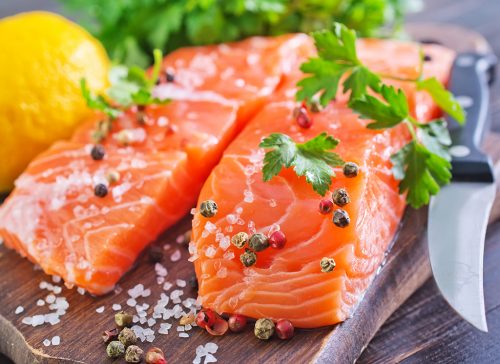Committing to a healthy diet can be hard when you’re a busy man with a lot on your to-do list—but the risks of not eating right are greater than the brief satisfaction of that sugary guilty pleasure. You know the basics of what you should be eating by now, yet you still pay lip service to the need for a diet rich in whole grains, fruit, vegetables, and fish—all of which are heart healthy foods. So it’s time to renew your commitment to your own body in order to keep your heart healthy because your lack of loyalty could be fatal. A heart-healthy diet can reduce your LDL (“bad”) cholesterol by 30 percent—a similar drop to what you can get from statin drugs. These heart healthy foods are dietary magic bullets: They lower LDL cholesterol, raise “good” HDL cholesterol, and, best of all, don’t require a prescription.

1 Nuts
People who eat an ounce and a half of nuts—pistachios, almonds, and walnuts are best—more than four times a week have a 37 percent lower risk for coronary heart disease than those who seldom eat nuts, according to a recent study in the British Journal of Nutrition. These nuts are great quick heart healthy foods that will suppress your appetite and keep you feeling fuller for longer.

2 Fish
Two servings a week of omega-3–rich fish is all it takes to significantly reduce the risk of heart disease, according to the American Heart Association. Docosahexaenoic acid (DHA) and eicosapentaenoic acid (EPA) are the omega-3 fatty acids in fish that do the coronary dark work. Wild salmon and Atlantic mackerel are its best sources.

3 Oats
Eating an average of two and a half servings of whole grains a day (e.g., oats, brown rice, barley) reduces your risk of cardiovascular disease by 21 percent, according to a new study in the journal Nutrition, Metabolism & Cardiovascular Diseases.

4 Avocados
Chock full of monounsaturated fat and beta-sitosterol, avocados deliver a double—barreled blast to LDL cholesterol. They are also rich in folate, a water-soluble B vitamin that helps lower the levels of homocysteine, an amino acid that can hinder the flow of blood through blood vessels.

5 Black Beans
People who eat one three-ounce serving of black beans a day decrease their risk of heart attack by 38 percent, according to a recent study in the Journal of Nutrition. Black beans are packed with superstar nutrients, including protein, healthy fats, folate, magnesium, B vitamins, potassium, and fiber. If you yourself are feeling like a superstar with the wallet to match after all these nutrients, read up on how to buy a private island to take advantage of your new healthy heart.

6 Flaxseed
A recent study of people with high cholesterol (greater than 240 mg/dL) compared statin treatment with eating 20 grams of flaxseed a day. After 60 days, those eating flaxseed did just as well as those on statins. Sprinkle ground flaxseed on oatmeal, yogurt, and salads.

7 Green Tea
EGCG, an antioxidant that helps fight heart disease, is plentiful in green tea. Drink it like water: Five cups of green tea daily can boost your cardiovascular health, according to several recent studies. But don’t add milk, it eliminates the benefits.

8 Watermelon
High in blood-pressure-lowering potassium, a good source of inflammation-reducing vitamin C, and rich in lycopene, a slice of watermelon or a glass of watermelon juice should be part of your daily diet of heart healthy foods.

9 Spinach
The heart-health equivalent of a first-ballot Hall of Famer, spinach is replete with the essential minerals potassium and magnesium, and it’s one of the top sources of lutein, an antioxidant that may help prevent clogged arteries. Eat one cup a day of fresh, or 1/2 cup cooked. Spinach has also been proven to help increase sex drive and improve blood flow.

10 Red wine
Swimming in resveratrol—a natural compound that lowers LDL, raises HDL, and prevents blood clots—red wine can truly be a lifesaver. The American Heart Association recommends two glasses a day. Vin rouge is also a rich source of flavonoids, antioxidants that help protect the lining of blood vessels in your heart. Not a drinker? Nibble dark chocolate. It contains the same flavonoids as red wine.












